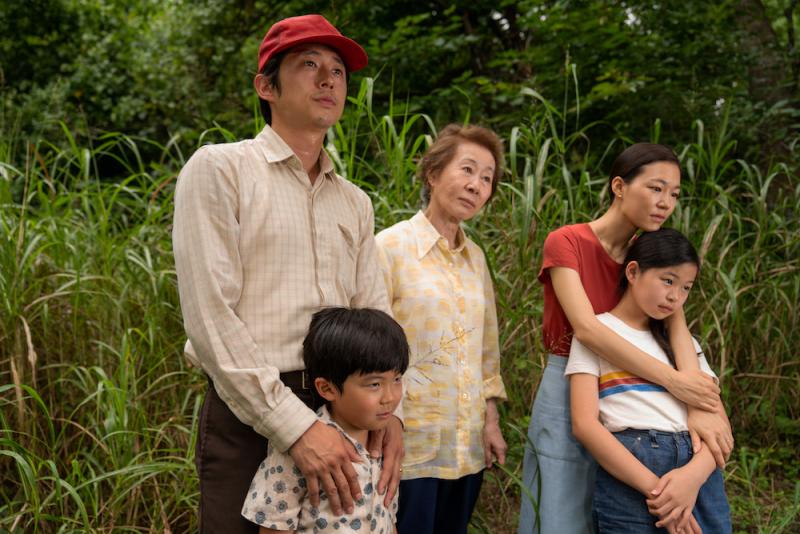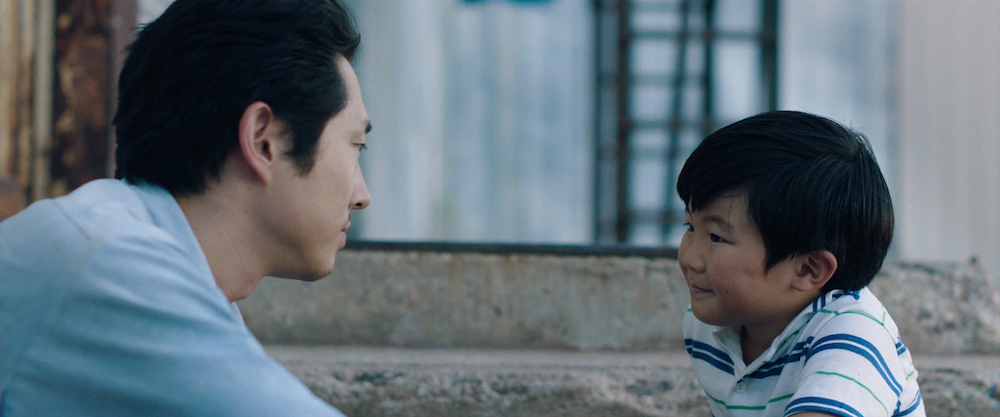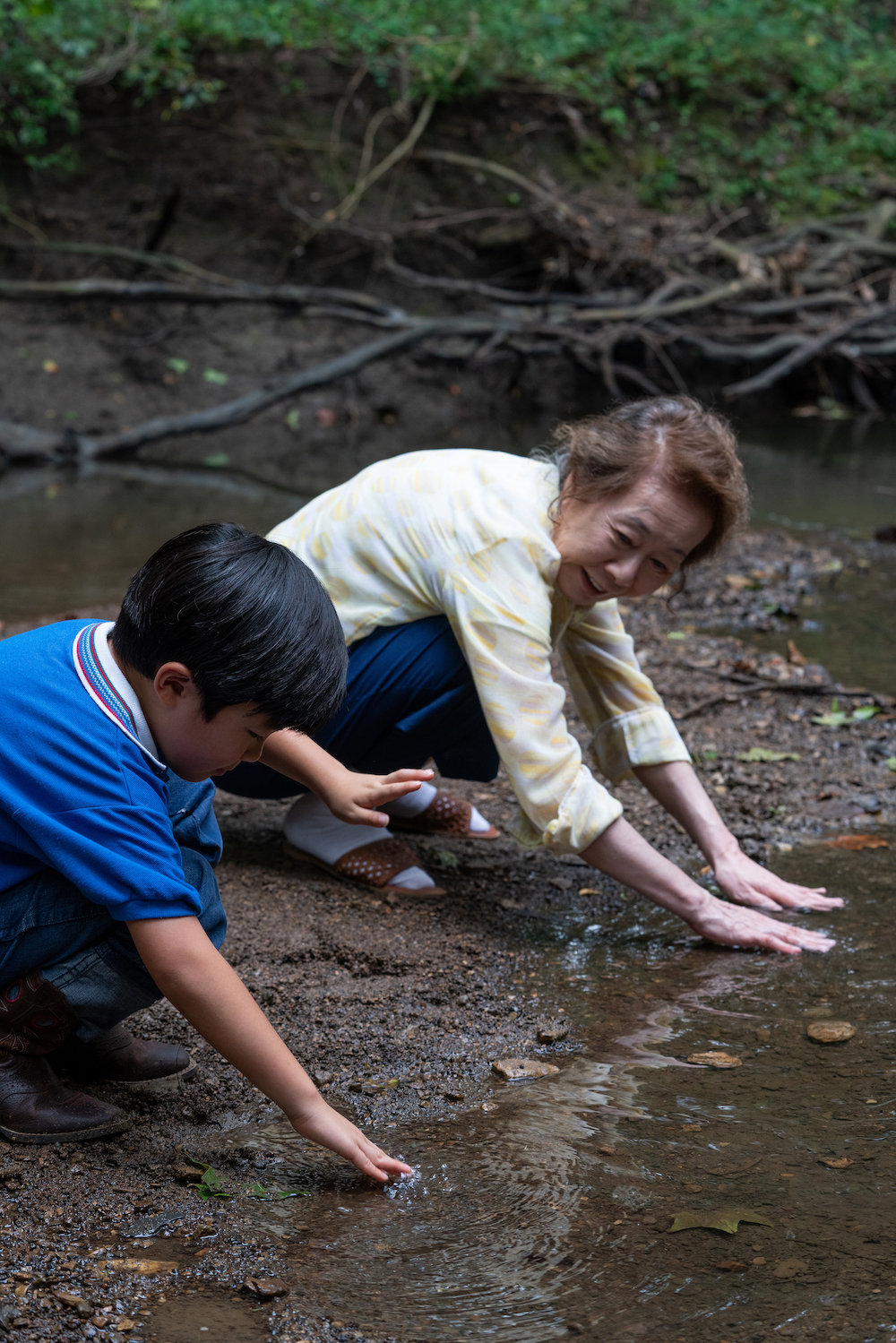Minari review - a Korean family searches for the American dream | reviews, news & interviews
Minari review - a Korean family searches for the American dream
Minari review - a Korean family searches for the American dream
Lee Isaac Chung's uplifting, autobiographical fourth feature is a winner

“David, don’t run,” is the refrain that runs through the first scenes of Lee Isaac Chung’s affecting, autobiographical Minari, acclaimed at Sundance, winner of a Golden Globe for best foreign language film (it’s mainly in Korean) and nominated for several Academy Awards.
They have plenty of other worries too. Jacob Yi (Steven Yeun; Sorry to Bother You, Burning, Okja, The Walking Dead) has brought his family from South Korea via California to a trailer in Arkansas, which is given the resonance of a William Eggleston photograph by Lachlan Milne’s beautiful cinematography. In some ways the film is like a series of tableaux. You sometimes wish for more detail, more connection between the scenes, but there’s still something wonderfully positive and uplifting about the whole.
The trailer comes with acres of land that Jacob plans to farm; he’s desperate for a fresh start and wants to move on from their job of sexing chicks – they’ve been at it for 10 years already - in commercial hatcheries. Monica was a slow worker in California but Arkansas is apparently less demanding, and she increases her speed by practising at home with boxes of the little birds. Yes, this surreal specialisation, which involves inspecting chicks’ genitals, is an actual job, which Chung's own parents worked at, though it's now on the decline. But this is the Eighties, and Jacob (pictured above with David) hopes to make a living by producing Korean vegetables for the thousands of Korean immigrants in the surrounding Midwestern cities (the story is based on Chung’s memories of his childhood, spent on a small farm in Arkansas). Monica has no faith in his American dream. She thinks they’d have been wiser to stay in California and pay off their debts there, and that this hillbilly place is too far away from a hospital for David.
But this is the Eighties, and Jacob (pictured above with David) hopes to make a living by producing Korean vegetables for the thousands of Korean immigrants in the surrounding Midwestern cities (the story is based on Chung’s memories of his childhood, spent on a small farm in Arkansas). Monica has no faith in his American dream. She thinks they’d have been wiser to stay in California and pay off their debts there, and that this hillbilly place is too far away from a hospital for David.
“It just gets worse and worse. This is not what you promised,” she sighs as he shows her the dingy trailer. This doesn’t say much for marital communication, but David and his sensible sister Anne (Noel Kate Cho, another impressive newcomer; her character could be a liitle more fleshed-out) are happy enough - it’s a house on wheels, there’s plenty of space outside. David whoops encouragingly when his father finds water for a well.
But the marriage gets rockier. The fellow who farmed the land before them went flat broke and you wonder if Jacob can do any better, though a helper arrives in the form of an eccentric evangelical (Will Patton) who’s prone to speaking in tongues when the spirit moves him and is keen to do exorcisms. Monica, convinced that it will all end badly, is often rigid and tearful with fury. The kids write, “Don’t fight,” on paper darts and throw them at their parents. Monica wants to start up a Korean church (there’s a large picture of Jesus and his flock on the trailer wall and she often tells David to pray) but her hatchery co-worker explains that the Koreans in Arkansas left the cities of a reason: to escape Korean church. So the family goes to the local one instead, and although racism seems likely, it doesn’t materialise. Chung manages to avoid the expected. “Why is your face so flat?” a boy asks David. “It’s not,” he replies, and the two become friends.
Monica wants to start up a Korean church (there’s a large picture of Jesus and his flock on the trailer wall and she often tells David to pray) but her hatchery co-worker explains that the Koreans in Arkansas left the cities of a reason: to escape Korean church. So the family goes to the local one instead, and although racism seems likely, it doesn’t materialise. Chung manages to avoid the expected. “Why is your face so flat?” a boy asks David. “It’s not,” he replies, and the two become friends.
Minari is full of charm, but never cloyingly so. Although obedient and responsible, Anne sighs, in a sarcastic echo of her mother, “It just gets better and better,” when David cuts his knee open and can’t go with her to the church picnic. He stays behind with his grandma Soonja (the brilliant Youn Yuh-Jung, pictured above; The Housemaid; Sense8) who Monica brings over from Korea – on arrival she hands over big bags of chilli powder and anchovies, reducing her daughter to tears of joy - to lessen her loneliness and provide childcare in this rural outpost.
At first David isn’t keen on this newcomer. He has to share a room with her and she doesn’t seem like a real grandma – she doesn’t bake cookies, she smells funny, she removes the $100 bill that Monica put in the church offering-plate. She swears and gambles and she teases him when he wets the bed, telling him that his penis is broken. “It’s not called a penis, it’s a ding-dong,” he retorts furiously. Later he retaliates by pissing into a cup and giving it to her to drink. His parents want to beat him but she takes his side. “Who cares if I drank a little pee? It was fun.”
When the well runs dry, Jacob uses the domestic water supply for the crops. Soon there’s no water in the trailer but David and Soonja, who tells him he’s the strongest boy she’s ever seen, haul water from the creek where she’s planted “wonderful, wonderful minari” with seeds from Korea. Minari, or water celery, is a vegetable, a medicinal garnish that will take root and grow anywhere – a metaphor for the immigrant experience. Maybe it’s the minari, maybe it’s his grandmother’s support, but David’s able to run by the end, even though it takes a catastrophe to bring his parents closer together.
- Minari is streaming on Minari.film and Altitude from 2 April
- More film reviews on theartsdesk
The future of Arts Journalism
You can stop theartsdesk.com closing!
We urgently need financing to survive. Our fundraising drive has thus far raised £49,000 but we need to reach £100,000 or we will be forced to close. Please contribute here: https://gofund.me/c3f6033d
And if you can forward this information to anyone who might assist, we’d be grateful.

Subscribe to theartsdesk.com
Thank you for continuing to read our work on theartsdesk.com. For unlimited access to every article in its entirety, including our archive of more than 15,000 pieces, we're asking for £5 per month or £40 per year. We feel it's a very good deal, and hope you do too.
To take a subscription now simply click here.
And if you're looking for that extra gift for a friend or family member, why not treat them to a theartsdesk.com gift subscription?
more Film
 Beating Hearts review - kiss kiss, slam slam
Romance and clobberings in a so-so French melodrama
Beating Hearts review - kiss kiss, slam slam
Romance and clobberings in a so-so French melodrama
 Materialists review - a misfiring romcom or an undercooked satire?
Writer-director Celine Song's latest can't decide what kind of film it is
Materialists review - a misfiring romcom or an undercooked satire?
Writer-director Celine Song's latest can't decide what kind of film it is
 theartsdesk Q&A: actor Leonie Benesch on playing an overburdened nurse in the Swiss drama 'Late Shift'
The Guildhall-trained German star talks about the enormous pressures placed on nurses and her admiration for British films and TV
theartsdesk Q&A: actor Leonie Benesch on playing an overburdened nurse in the Swiss drama 'Late Shift'
The Guildhall-trained German star talks about the enormous pressures placed on nurses and her admiration for British films and TV
 Freakier Friday review - body-swapping gone ballistic
Lindsay Lohan and Jamie Lee Curtis's comedy sequel jumbles up more than their daughter-mother duo
Freakier Friday review - body-swapping gone ballistic
Lindsay Lohan and Jamie Lee Curtis's comedy sequel jumbles up more than their daughter-mother duo
 Eight Postcards from Utopia review - ads from the era when 1990s Romania embraced capitalism
Radu Jude's documentary is a mad montage of cheesy TV commercials
Eight Postcards from Utopia review - ads from the era when 1990s Romania embraced capitalism
Radu Jude's documentary is a mad montage of cheesy TV commercials
 The Kingdom review - coming of age as the body count rises
A teen belatedly bonds with her mysterious dad in an unflinching Corsican mob drama
The Kingdom review - coming of age as the body count rises
A teen belatedly bonds with her mysterious dad in an unflinching Corsican mob drama
 Weapons review - suffer the children
'Barbarian' follow-up hiply riffs on ancient fears
Weapons review - suffer the children
'Barbarian' follow-up hiply riffs on ancient fears
 theartsdesk Q&A: filmmaker Dag Johan Haugerud on sex, love, and confusion in the modern world
The writer-director discusses first-love agony and ecstasy in 'Dreams', the opening UK installment of his 'Oslo Stories' trilogy
theartsdesk Q&A: filmmaker Dag Johan Haugerud on sex, love, and confusion in the modern world
The writer-director discusses first-love agony and ecstasy in 'Dreams', the opening UK installment of his 'Oslo Stories' trilogy
 Oslo Stories Trilogy: Dreams review - love lessons
First love's bliss begins a utopian city symphony
Oslo Stories Trilogy: Dreams review - love lessons
First love's bliss begins a utopian city symphony
 Blu-ray: Two Way Stretch / Heavens Above!
'Peak Sellers': two gems from a great comic actor in his prime
Blu-ray: Two Way Stretch / Heavens Above!
'Peak Sellers': two gems from a great comic actor in his prime
 Late Shift review - life and death in an understaffed Swiss hospital
Petra Volpe directs Leonie Benesch in a compelling medical drama
Late Shift review - life and death in an understaffed Swiss hospital
Petra Volpe directs Leonie Benesch in a compelling medical drama

Add comment